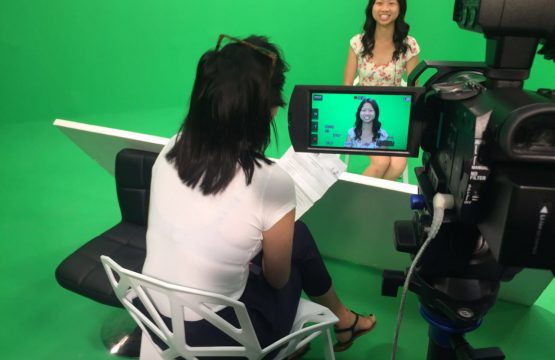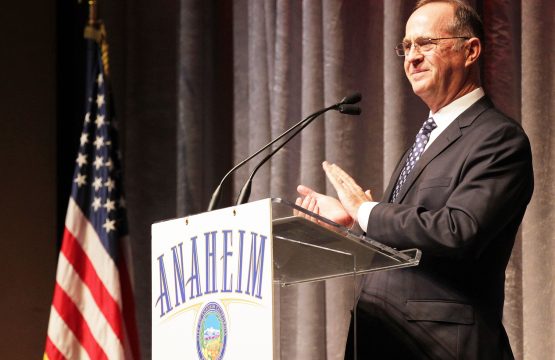Meet Grace Lee: An unexpected champion
Yeon Jin Lee was given the name Grace by her English tutor in Seoul, South Korea. Not only did the name stick, but without a doubt, it’s defining. Showing tremendous grace under pressure is something Lee has grown accustomed to for the past 15 years, as she’s lived and studied in the United States in a constant state of financial and residential uncertainty.
By the age of 13, Lee had moved to three countries and had already lived nine lives. Lee, her parents and her younger brother lived a comfortable middle-class life in Seoul. Her mother, Young Hee Kim, was a highly educated professional musician, playing the Gayageum, a traditional Korean string instrument, in the orchestra. Her father, Sung Gu Lee, worked in accounting. When a business opportunity took the family to Jakarta, Indonesia, Lee witnessed firsthand the stark disparity between the rich and the poor, something that stuck with her. When her father’s venture didn’t take off in Jakarta, however, the Lees returned to Seoul, only to be hit by Asia’s economic crisis in the early 2000s. With fleeting job opportunities in Korea, the family decided to travel to America. They left Seoul in 2001 and arrived in California on a visitor visa when Lee was 12 years old.
“The plan was that we would stay with friends for three months, so we only packed a few things, but then we never went back,” Lee said. “And once we decided to stay, the immigration process started. Once that starts, you can’t really go back. We didn’t go back for 14 years.”
The next 14 years proved to be an arduous and stressful journey through the immigration process. The Lees went from being a secure, middle-class family in Seoul to a fragile, low-income immigrant family in Los Alamitos, California. And like many children of immigrant parents, the burden was on Lee to help navigate between the two cultures. She taught herself to read, write and speak English, not only so she could get by, but to translate bills, mail and immigration and legal documents for her non-English speaking parents. Her mother waitressed at Korean restaurants, while her father apprenticed at auto shops, all the while struggling to find a sponsor for their visa.
“When we moved, we were so naïve, we didn’t know what the process was going to be like,” Lee explained. “There’s just so little information about the black box that is immigration and how long it would take. The volatility of your situation leaves you begging for stability. It was all about managing anxiety.”
Despite the legal hardships and financial instability, Lee’s parents knew that staying in this country would provide their children with educational opportunities not available in Korea. At Los Alamitos High School, Lee pushed past her obstacles, found a certain sense of stability and flourished. With A’s in AP and honors classes and a number of awards rolling in, Lee was an academic all-star. She challenged herself athletically as well, running track and cross country. Lee also found time to take on leadership roles in clubs from the Mechanical Engineering Club to the Math Honor Society and dedicated many hours to community service projects, a true passion of hers.
Leading up to her senior year of high school, Lee traveled to Cambridge, Massachusetts, to attend MIT’s Women in Technology summer program. There she met doctors who were manufacturing organs from robots and engineers who were improving the water supply in villages in Ghana. Lee had a real moment of clarity regarding the direction of her future career. While she always felt a strong pull toward the arts and humanities, at MIT, Lee met interdisciplinary innovators that were leaving a large impact on the world, and it blew her away.
“The program taught me to look for creative ways to look for a solution. By finding the common link between the two seemingly opposite fields, I discovered a whole new path leading toward my future. The potential that I could do bigger things, the limitless possibilities that I could do something that is impactful, it meant a lot to me. It still does,” she said.
After her summer at MIT, Lee was pretty certain she’d be studying computer science once in college. But the path to paying for college wasn’t as clear. With the joy of an acceptance letter from the prestigious University of California, Berkeley, came the crushing reality of not receiving any loans because of her immigration status. According to Berkeley’s books, Lee was simply an international student — not a low-income immigrant. And while being both an Earl Woods Scholar and a New American Scholar helped, both scholarships only made a dent in her massive international student fees.
“You can’t get federal loans; you can’t get state loans because you are considered an international student,” she explained. “I didn’t talk to anybody about my visa situation and how I was going to afford college. I was worrying about it but didn’t know who to ask. I already knew my parents wouldn’t have the answer. I had lots of nights regretting that I only got into a UC school and wished I was in a private school because they have more endowments,” Lee confessed.
Lee soldiered on and majored in electrical engineering and computer science. The workload was challenging and the lack of class diversity didn’t make the situation any easier. She remembers being one of just five female students in a lecture hall with 200 male computer science students. While she openly admits that the financial stress brought on by her tuition left her struggling academically, Lee fought and triumphed, gracefully.
“One thing about Grace was her passion for obtaining an education,” said Cristina Fernández, senior director of the Earl Woods Scholarship Program. “She didn’t let the cost of attending Berkeley deter her. She was methodical about her budgeting and planned in advance to obtain the funds she needed each semester. She asked for help and researched additional scholarships.”
Throughout some of her most difficult moments, the staff at the Tiger Woods Foundation served as a beacon for Lee. However, it was the program’s accessibility to immigrants like her that left a lasting impression.
“They are so understanding about your situation,” Lee said. “So many scholarships, even the private scholarships that I encountered, have a requirement that says you must have a social security number. I didn’t have one. You must have a permanent residency. And I didn’t have that either. But this scholarship didn’t have those requirements. So already they were opening doors for somebody like me who had been in the country but on a temporary visa. For people who are undocumented, you can imagine how limited the resources are for them.”
While her parents both attended college in Korea, the culture clash made it hard for Lee to turn to them for advice on classes, internships and jobs. The mentorship pairing, a vital component of the Earl Woods Scholarship Program, provided Lee with one-on-one support all four years of college and beyond. That support came via Michael P. Johnson, a successful Tulsa, Oklahoma-based CEO.
“In my experience, like many minority students, I didn’t necessarily have resources like good mentors. And often our parents know less than we do,” Lee admitted. “At Berkeley, what I observed is that a lot of my friends had parents who were Ph.D.’s that absolutely mentored them through academia. They didn’t realize it, but I saw it because I didn’t have it. Mentorship is a privilege that immigrant families and minorities don’t usually have.”
While they lived in different cities, Johnson was always a phone call away.
“He gave me really great advice,” Lee said. “Every time I would have to make a big decision about my career, what classes to drop or take, how to spend the summer, I called Michael and consulted with him. All his advice ended up being really helpful. He was like a father figure to me.”
And for Johnson, president and CEO of J&A Group and a board member of two public companies, Buffalo Wild Wings and Center Point Energy, his mentorship with Lee left an indelible mark on him as well — so much so that Lee’s first name was the inspiration for Johnson’s second grandchild, named Grace.
“My most memorable moment I had with Grace was when I flew out to watch her graduate from Berkeley. To see the expression on the faces of her parents, that was very, very special,” Johnson said. “All the times we spoke on the phone, to see her walk across that stage and receive her degree, was a real highlight in my life. I received as much out of the relationship with Grace as she did. She’s really grown over the years. Most significantly, Grace has found insights into herself, becoming more confident and outgoing. She can be counted on to stand up for what she believes in. She’s developed focus and clarity regarding where she would ultimately take her career.”
With her unstoppable attitude and the unwavering support from Johnson, EWSP staff and professors, advisors and mentors at Berkeley, Lee’s career growth is extraordinary. Animation and tech mecca Pixar was one of the first companies to spot her talent, when they scooped her up for an internship the summer before her senior year. Her technical computer science skills coupled with her sharp artistic eye made Lee an ideal addition to their computer graphics department. Her seven-month role at Pixar sparked her interest in filmmaking and solidified her passion in storytelling.

And upon graduation, Lee was courted by three leading companies for full-time positions: NASA, Blizzard and Samsung. She went with NASA. For Lee, choosing the right company to sign with had little to do with the salary or the name recognition and almost everything to do with immigration.
“I needed a steady job that could give me a green card,” Lee said. “That was always on my mind; you need a steady sponsor.”
And for Lee, NASA, a government-run organization, seemed to fit the bill. NASA has proven to be a wonderful opportunity for Lee. As an engineer, she travels to Idaho and Hawaii to visit lava beds to work on XGDS, short for Exploration Ground Data Systems. In laymen’s terms, she’s helping scientists study terrain that most closely resembles the terrain on Mars. Along the way and while working full time, Lee picked up a M.S. in software engineering from Carnegie Mellon University’s Silicon Valley branch inside NASA Ames Research Park.
Along with an additional degree, last November Lee finally received another document: her green card, thanks to her sponsorship from NASA. And around the same time as Lee, her parents also received theirs, 14 years after the Lees landed in the United States. Armed with her green card, Lee has new plans for her next chapter. She will be shifting gears and plans to attend an MFA program in Southern California.
“It’s what I’ve been wanting to do since Pixar. It’s been a dream that has been stewing, kind of growing and hasn’t gone away.”
Lee’s love of film and storytelling is very much tied to her own experience. Her first film, “Driving While Undocumented,” tells the true story of Lee’s Hispanic friend who was pulled over by a cop. In the film, she explores the anxiety and fear of deportation felt by all undocumented people living in this country. For Lee, the medium of film is more than entertainment. It’s a way to connect, heal and share lived experiences with one another.
“Immigration reforms are so important to me because I know it shatters families and puts this undue stress on kids and parents,” she said. “The whole immigration experience is incredibly stressful. You wouldn’t imagine that a piece of paper — a green card — would have such a psychological impact on everybody. There’s a lot in that piece of paper.”
TWF’s vice president of operation and administration Jin Thatcher, who has guided Lee over the years, sees her transition into film as a true source of pride.
“Grace is still a dreamer and has so much ambition and creativity in her soul,” Thatcher said. “I love that she is still taking the time to chase and reach her dreams to create her own film. She is up for the challenge. She is making her own dreams come true!”
And with her first film already underway, Lee is finally living the American Dream.
Champions of the unexpected for 20 years.


